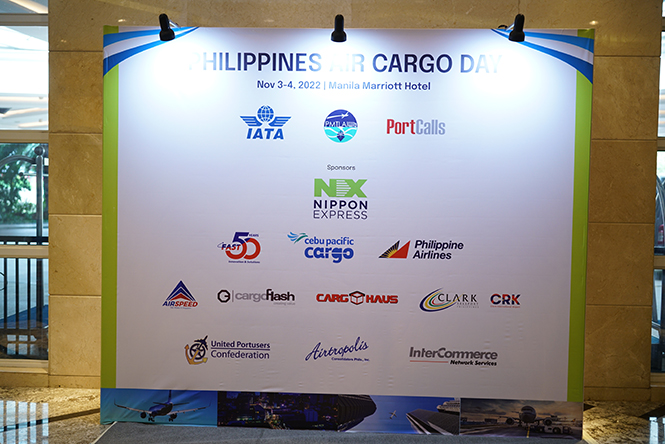Philippine Air Cargo Day 1 – November 3, 2022 held at Mariott Hotel Manila in New Resorts World

On November 3, 2022 PortCalls alongside PMTLAI, organized the first Philippines Air Cargo Day in Mariott Hotel Manila in New Resorts World. The Event was attended and sponsored by various role players in the Air Cargo Forwarding Industry, which includes Forwarders, Airlines, Bureau of Customs, CAAP, Department of Transportation and IATA.
The entire day was filled with talks and discussions about the current trends for Air Cargo, including agendas such as Digitization, Establishment and Alignment of Standards for all steps in the transport of goods via Air.
The first talk with Mr. David Wee, Regional Manager Operations, Safety and Security set up the background of the Air Cargo trends in the world and how it was affected by COVID. Surprisingly, due to the surge of e-commerce, Air Cargo trended to gain since 2021. During Covid, the belly space of an aircraft was exclusively used for cargo as passengers barely traveled during this time, but starting this year, we see a trend back to normalcy to pre-covid ratios between passengers and cargo. The estimate is that by 2024, we should return back to the ratios during pre-covid times.
The Second speaker was Andre Majeres, Head Ecommerce and Cargo Operations, who is in charge of capitalizing, studying and providing standards for the growing e-commerce markets that are in Air Cargo. During this time, e-commerce has had special agreements with airlines as well as governments to create faster delivery times and releasing compared to normal cargo. The Airline’s requirements for e-commerce cargo continues to grow yearly and now that it has been identified as a distinct category, stakeholders can now discuss what value they can provide for this continually growing industry.
Andre also introduced the Master operating plan – which is the process for the journey of a piece of cargo from shipper to the consignee. IATA has published a manual as to the procedure per step. To support this, they also published the IATA Cargo Handling Manual which is the step-by-step standard on how you will handle all types of cargoes and the aim is to harmonize these standards for all airlines and governments all over the world.
There was then the first panel composed of Mr. Joey of Cebu Pacific, Ms. Cherry of PAL and Ms. Rosemarie of Airspeed and they discussed the adaptations their respective companies needed to do in order to survive during the covid pandemic. The main point of the panel discussed how important being agile companies must be during these times in order to survive the challenges of a pandemic. It was also pointed out that working together is essential in solving many of the problems that arise during uncertain times. So, both PAL and Cebu Pacific now find other solutions by working with other airlines or other partners and do not only rely on their own companies to maintain the service expected from them.
The Third Speaker was CAAP’s Director Arcilla and his topic was cutting the red tape. He mentioned R.A. 9485 as well as the “Ease of Doing Business Act” R.A. 11032 in order to do GOOD. Which means to Gauge the targets, Organize the process flow, Operate within set standards and Delete the unnecessary. However, Dir. Arcilla specially mentioned that although we aim to cut the red tape, it does not mean that you will relax the standards. This means that although there are fewer documentary requirements, the current requirements such as publication must be strictly imposed. Dir. Arcilla also mentioned the shared initiative with DTI for shared accreditation between the two departments. This means forwarders will eventually only need to submit one set of documents for both Airfreight and Seafreight in order to do business in the Philippines.
Andre of IATA then mentioned that there is currently an online platform that is being used by IATA to certify the capacities of the stakeholders and that can be seen on the IATA website – Smart Facility Operational Capacity Certification. Here IATA can certify whether a stakeholder has the capacity that they publish on their websites.
The Fourth Speaker was Ms. Carmelita Talusan – the District Collector CESOV of the Bureau of Customs. She mentioned that there is now a Trade Facilitation Initiative in Airfreight, but while facilitation was important for the Bureau, she emphasized that they have 2 other mandates that they need to do which are Revenue Collection and Border Protection. In terms of Revenue collection, Ms. Talusan said that the BOC has a target of 150m collection per day but thankfully, they have been exceeding those targets in the past few years. She updated us that the BOC has automated and updated their profiling of goods being sent in the Philippines and they have seen patterns of when drugs are being smuggled. They have data of what baggage or commodity is being used as well as whether the person smuggling is usually a male or a female. BOC is also now ISO certified with 27 processes that have been certified.
Next speaker was Ms. Marigrace Gutierrez of the Clark CFZ. She mentioned all the new benefits in the Clark Airport as well as the companies doing business in their new facility.
The final speakers discussed technical matters on how to create EAWB and the benefits of transitioning to a CXML system compared to a CISP. They mentioned that in the current market, customers want 1.) Promised delivery time, 2.) Tracking their goods and 3.) Transparency in the processes of how they got their goods. So, IATA have several initiatives to cater to this new market such as one record data sharing, Interactive Cargo and End-to-end live checking of their goods. It was also important how many countries are now requiring a Pre-Loading advanced cargo information before aircraft take off and IATA is aiming to standardize and harmonize these processes.
Details & Establishing
Speakers
Awarding
Group Photos

























































































